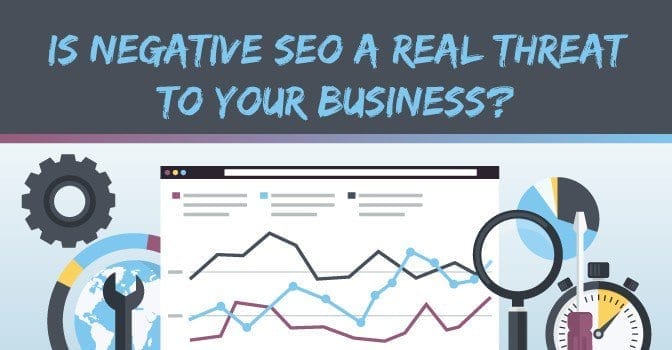When it comes to search engine optimization and Internet marketing, there are a lot of things to worry about – creating content, optimizing conversions, and improving your Google ranking can all be big traps. But at least those are items under your control.
More and more, marketers are finding themselves worried about negative SEO: the practice of trying to hurt a competitor’s search rankings through unethical tactics.
How exactly does that work? And, more importantly, is negative SEO a real threat to your business? Let’s take a look at the details…
How Negative SEO Works
The premise behind negative search engine optimization is actually pretty simple. Not long ago, Google stopped counting certain types of links (like those coming from link farms) in its search algorithm. Then, it started actively punishing website owners who seemed to be trying to game the system.
Once marketers realized that a lot of the “quick and easy” approaches they were taking to building links didn’t just stop working but are actively hurting their search positioning, it didn’t take long for a few of them to figure out that they could keep it up by pointing those links elsewhere.
In that way, negative SEO is like having someone else do a really bad job of search engine optimization on your behalf. It’s just that, in this case, you didn’t ask them to do it in the first place.
The Two Best Defenses Against Negative SEO
There are really two good ways to protect yourself from negative SEO. The first is by auditing your search position on a regular basis and seeing what kinds of links you have pointing to your website. A sudden spike in low-quality inbound links is a sure sign that someone is targeting you because they want your spot on Google. Your web design team can go through and disavow these links for you, essentially making sure they don’t count in the search rankings.
The second thing you can do is simply keep up your good SEO efforts. Having fresh content, high-quality inbound links, and an orderly site map is a good way to show the search engines that you’re ethical and know what you’re doing. Once they see your website is clean, they are less likely to count a sudden burst of low-quality links against you.
In other words, the majority of companies with strong SEO plans in place shouldn’t be too concerned.
Most businesses with a strong search engine profile and lots of unique content shouldn’t have to worry too much about negative SEO; after all, it tends to affect websites that are already marginal from Google’s point of view the most. Still, it’s worth keeping an eye on your search positioning and link profiles to ensure that nothing bad is happening behind your back.
The best way to bring traffic to your website is by following the best practices of search engine optimization. But, you can’t always count on your competitors to do the same.










